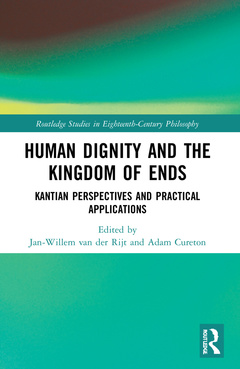Human Dignity and the Kingdom of Ends Kantian Perspectives and Practical Applications Routledge Studies in Eighteenth-Century Philosophy Series

This book advances our understanding of the nature, grounds and limits of human dignity by connecting it with Kant?s notion of an ideal moral community, or "Kingdom of Ends". It features original essays by leading Kant scholars and moral and political philosophers from around the world.
Although Kant?s influential injunction to treat humanity as an end in itself and never merely as a means has garnered the most attention among those interested in analyzing human dignity with a Kantian lens, Kant himself places much more emphasis on the Kingdom of Ends as crucial for defining human dignity. The chapters in this collection focus not only on interpretive issues related to the Kingdom of Ends but also on practical applications that have the potential to advance discussions about the nature and foundations of rights, the content of moral principles, the importance of moral ideals and attitudes and the nature of moral motivation. Exploring and connecting the ideas of human dignity and the Kingdom of Ends significantly deepens our moral understanding, advances discussions in moral and political philosophy and enhances our appreciation of Kant?s moral theory.
Human Dignity and the Kingdom of Ends: Kantian Perspectives and Practical Applications will appeal to scholars and advanced students of Kant, moral philosophy, political philosophy, and political theory.
Introduction
Jan-Willem van der Rijt and Adam Cureton
Part I. Human Dignity and the Kingdom of Ends in Kant’s Groundwork
1. The Dignity of Freedom
Paul Guyer
2. The Kingdom of Ends in the Groundwork
Oliver Sensen
3. "Closer to intuition (according to a certain analogy) and thereby to feeling:" Making Kant’s Kingdom of Ends Intuitive
Mark Timmons
4. Kant’s Understanding of Human Dignity as Self-Determination in the Realm of Ends
Dietmar von der Pfordten
Part II. The Politics of Human Dignity and the Kingdom of Ends
5. Honeste Vive: Dignity in Kant’s Theory of Juridical Obligation
Alice Pinheiro Walla
6. All Kings in the Kingdom of Ends?
Jeremy Waldron
7. The Transmutation of Dignity: Kant, neo-Roman Republicanism, and the Commonwealth of Ends
Jan-Willem van der Rijt
8. Respect and Retribution in the Kingdom of Ends
David Sussman
9. Kantian Human Dignity and a ‘Community of Rights’
Marcus Düwell
10. Poverty, Dignity, and the Kingdom of Ends
Corinna Mieth and Garrath Williams
Part III. The Ethics of Human Dignity and the Kingdom of Ends
11. Legislating in the Fray: Lillian Hellman and the Kingdom of Ends
Sarah Holtman
12. The Kingdom of Ends as Ideal
Kiran Bhardwaj
13. Gaslighting, Self-Respect, and the Kingdom of Ends
Cynthia A. Stark
14. Knowledge, Error, and Enlightenment in the Kingdom of Ends
Adam Cureton
15. Deliberating with Solidarity, Respect, and Appreciation
Thomas E. Hill, Jr.
Jan-Willem van der Rijt is Associate Professor in Philosophy at Umeå University (Sweden). His research is centered on the themes of dignity, wellbeing, and strategic interaction. He authored The Importance of Assent: A Theory of Dignity and Coercion (2012) and co-edited Wellbeing in Contemporary Society (2015) and Focal Points in Negotiation (2020).
Adam Cureton is Professor of Philosophy at the University of Tennessee (USA). He primarily works on issues in moral theory, Kant’s moral philosophy, and practical ethics, especially the philosophy of disability. He co-edited Disability and Disadvantage (2009), Disability in Practice (2018), and The Oxford Handbook of Philosophy and Disability (2020).
Date de parution : 01-2024
15.2x22.9 cm
Date de parution : 12-2021
15.2x22.9 cm
Thème de Human Dignity and the Kingdom of Ends :
Mots-clés :
Kant’s Practical Philosophy; Kantian Dignity; Jan-Willem van der Rijt; Von Der Pfordten; Adam Cureton; Free Agent; Paul Guyer; Universal Law Formula; Dietmar von der Pfordten; Van Der Rijt; Oliver Sensen; Kant’s Moral; Jeremy Waldron; Categorical Imperative; Sarah Holtman; Imperfect Duties; Alice Pinheiro Walla; Neo-Roman Republicanism; Marcus Düwell; Rational Interests; David Sussman; Cpr A813; Corinna Mieth; Violates; Garrath Williams; Human Dignity; Cynthia A; Stark; CPJ; Thomas E; Hill Jr; Moral Principle; Mark Timmons; Conferred; Kiran Bhardwaj; Unlimited; Follow; Kant; Perfect Duties; Kingdom of Ends; Kant’s Moral Psychology; human rights; Moral Equal; respect; Kant’s Philosophical System; moral standing; Supreme Moral Principle; political standing; Kant’s Political Theory; self-determination; citizenship; community of rights; self-respect; retribution; revenge; humanity; gaslighting; solidarity



